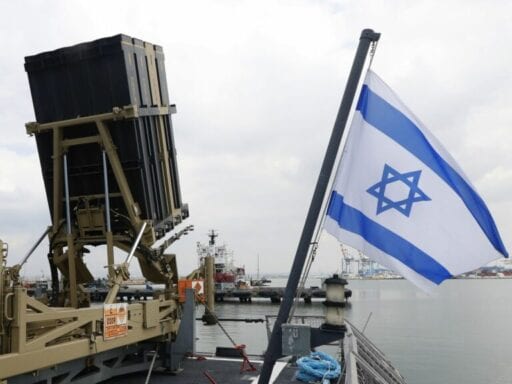After a failed rocket attack on the major city, conflict between Israel and Gaza could get worse.
Tensions between Israel and Gaza — already extremely high — may grow even higher in the coming hours.
On Thursday, two long-range rockets fired from Gaza streaked toward Tel Aviv, one of Israel’s largest cities. And although no casualties or property damage have been reported so far, Israel is likely to respond forcefully.
Which means an already roiling crisis in the Middle East is likely to deepen.
Red alert sirens indicating incoming rockets sounded in Tel Aviv indicating the first time that the city was a target since 2014. That year, Israel and Gaza engaged in brutal, weeks-long fighting. The Israeli military said its missile defense system, Iron Dome, was launched to intercept the rockets, although it’s unclear if an interception actually took place. The video below shows Iron Dome interceptors flying through the night sky over Tel Aviv, but they self-destructed because an interception was unnecessary.
Video of Iron Dome intercept. This is right over Tel Aviv. pic.twitter.com/At74t4pAO9
— Neri Zilber (@NeriZilber) March 14, 2019
One Israeli journalist tweeted that he was sitting in his living room when “suddenly” there were sirens and “sounds of explosion.” Tel Aviv has opened bomb shelters for citizens to use overnight.
The question now is what happens next. The answer, depressingly, seems pretty clear: retaliation.
Israel will surely hit back — hard
It’s unclear who, exactly, was behind the rocket attack. But since it came from Gaza, the territory will be in Israel’s crosshairs over the coming hours.
Israel has conducted airstrikes in Gaza in recent months because Hamas — a Palestinian Islamist political organization and militant group that has waged war on Israel since the group’s 1987 founding and ruled Gaza since 2007 — keeps shooting short-range rockets into the nation’s south.
Last November, the two sides engaged in days of fighting that saw fighters and civilians on both sides die.
But a long-range rocket attack on Tel Aviv is a serious escalation, which means groups in Gaza — like Hamas — may be trying to send a message, according to Neri Zilber, a Middle East expert at the Washington Institute for Near East Policy think tank.
He told me that militants in Gaza may have decided to launch the rockets to deflect popular anger directed at Hamas leaders in Gaza as well as to regain the attention of international actors, including Israel, to work on potential reconciliation.
Peace, though, seems very, very far away right now. Instead, Israeli Prime Minister Benjamin Netanyahu — who faces a tough reelection battle in April — only has incentives to strike back.
“Netanyahu will respond, but will likely respond within reason,” Zilber said. That means the prime minister may still authorize dozens or more airstrikes, but the Israeli military will likely strike important but largely empty targets like command centers, headquarters, and training grounds for militants in Gaza.
Should Israel end up killing scores of Palestinians or hit occupied buildings, it could signal a new phase in Israel’s response to rocket attacks. And if that’s the case, we may see more intensive fighting between the two sides over the next few days.
Author: Alex Ward
Read More



